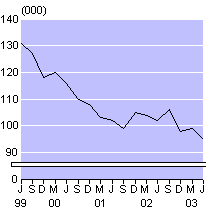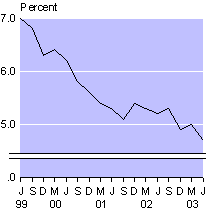DROP IN NUMBER OF UNEMPLOYED
IN LAST THREE
MONTHS
March 2003 to June 2003
4,000 people
.
DROP IN NUMBER OF UNEMPLOYED
IN THE LAST YEAR
June 2002 to June 2003
7,000 people
Source — Statistics NZ
OFFICIALLY UNEMPLOYED IN THE REGIONS
June 2003 |
| NORTHLAND |
7.3% |
or one in 14 people |
| AUCKLAND |
4.0% |
or one in 25 people |
| WAIKATO |
4.9 |
or one in 20 people |
| BAY OF PLENTY |
6.6% |
or one in 15 people |
| GISBORNE - HAWKES BAY |
4.0% |
or one in 25 people |
| TARANAKI |
5.6% |
or one in 18 people |
| WANGANUI - MANAWATU |
5.1% |
or one in 20 people |
| WELLINGTON |
4.8% |
or one in 21 people |
| NELSON - MARLBOROUGH TASMAN - WEST COAST |
3.0% |
or one in 33 people |
| CANTERBURY |
4.4% |
or one in 23 people |
| OTAGO |
5.6% |
or one in 18 people |
| SOUTHLAND |
3.6% |
or one in 28 people |
| Source — Statistics NZ |
REGIONS WITH A DROP IN UNEMPLOYMENT
IN THE LAST THREE MONTHS
September 2002 to June 2003
Northland
Auckland
Waikato
Gisborne/Hawkes Bay
Wellington
Nelson/Marlborough/
Tasman/West Coast
Bay of Plenty
Canterbury
Otago
REGIONS WITH NO CHANGE IN UNEMPLOYMENT
None
REGIONS WITH A RISE IN UNEMPLOYMENT
Taranaki
Wanganui/Manawatu
Southland
Registrations at Ministry of Social Development
(formerly Winz)
PEOPLE REGISTERED AS JOB SEEKERS
WITH MINISTRY OF SOCIAL DEVELOPMENT
June 2003
144,575
NOTIFIED VACANCIES
for month of June 2003
Figures Unavailable
Source — Ministry of Social Development
The Underemployed
June 2003
103,600 people
According to Statistics NZ, the underemployed are workers who are employed part time but would prefer to work more hours
The Employed
NUMBER OF PEOPLE IN JOBS IN NEW ZEALAND
June 2003 seasonally adjusted
1,911,000 people
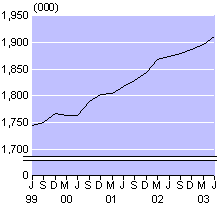
RISE IN THE NUMBER OF PEOPLE IN JOBS IN LAST 3 MONTHS
March 2002 to June 2003
15,000
RISE IN THE NUMBER OF PEOPLE IN JOBS IN LAST YEAR
June 2002 to June 2003
37,000 people
SECTORS WITH A RISE IN EMPLOYMENT IN LAST YEAR
Wholesale & Retail Trade, Construction, Education, Health & Community Services,
SECTORS WITH A DROP IN EMPLOYMENT IN LAST YEAR
Agriculture, Forestry & Fishing, Manufacturing, Transport, Storage & Communication, Business & Financial
Full-time and Part-time
GAIN IN FULL-TIME EMPLOYED
IN THE PAST YEAR
June 2002 to June 2003
34,000 people
Full Time Employment
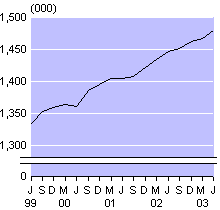
GAIN IN PART-TIME EMPLOYED
IN THE PAST YEAR
June 2002 to June 2003
3,000 people
Part Time Employment
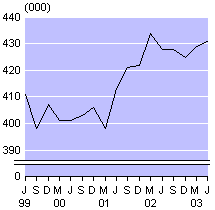
| ... |
Full-time |
Part-time |
|
Men |
917,200 (89%) |
118,100 (11%) |
|
Women |
543,600 (63%) |
322,400 (37%) |
|
Total |
1,460,800 |
440,500 |
|
Overall % |
77% |
23% |
| Source — Statistics NZ |
Global Unemployment Rates
SPAIN
11.3%
GERMANY
9.4%
FRANCE
9.1%
ITALY
8.7%
CANADA
7.8%
OECD AVERAGE
7.2%
UNITED STATES
6.2%
AUSTRALIA
6.2%
JAPAN
5.4%
BRITAIN
5.0%
NEW ZEALAND
4.7%
Officially Jobless
"Those without a job
and wanting a job ..."
These are the statistics that are more commonly used
by community workers and employment activists in New
Zealand because they more accurately reflect the
people who are their concern or clients.
These "Jobless" figures are also based on the
Household Labour Force Survey run by Statistics NZ,
but include a wider definition of unemployment,
usually referred to "those without a job and wanting
a job".
ONE IN TWELVE PEOPLE OFFICIALLY JOBLESS IN NZ
According to Statistics NZ, the difference between
the official "unemployment" figures and the "jobless
figures" is that many of the people on the jobless
measurement are available for work, but not actively
seeking it.
The reasons for not actively seeking work range from
people being discouraged because they lack the skills
needed, or were the wrong age, or that the right work
was not available in their area, or they were only
looking for jobs in their newspaper. This measurement
also includes those actively seeking work but not yet
available for it.
OFFICIAL NUMBER OF JOBLESS IN NZ
June 2003
161,700 people
OFFICIAL RATE OF JOBLESS
June 2003
7.8%
OR ONE IN 13 PEOPLE
DROP IN NUMBER OF JOBLESS
IN LAST THREE
MONTHS
March 2003 to June 2003
12,900
DROP IN NUMBER OF JOBLESS
IN THE LAST YEAR
June 2002 to June 2003
9,900 people
Source — Statistics NZ
JOBLESS IN THE REGIONS
June 2003 |
| NORTHLAND |
11.0% |
or one in 9 people |
| AUCKLAND |
6.4% |
or one in 16 people |
| WAIKATO |
7.2% |
or one in 14 people |
| BAY OF PLENTY |
11.8 |
or one in 8 people |
| GISBORNE - HAWKES BAY |
8.5% |
or one in 12 people |
| TARANAKI |
9.8% |
or one in 10 people |
| WANGANUI - MANAWATU |
8.2 |
or one in 12 people |
| WELLINGTON |
8.1% |
or one in 12 people |
| NELSON - MARLBOROUGH TASMAN - WEST COAST |
5.9% |
or one in 17 people |
| CANTERBURY |
7.3% |
or one in 14 people |
| OTAGO |
11.9% |
or one in 8 people |
| SOUTHLAND |
6.6% |
or one in 15 people |
| Source — Statistics NZ |
Labour Force Participation Rate
LABOUR FORCE PARTICIPATION RATE
June 2003
66.2%
Labour Force Participation Rate
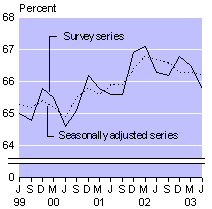
Source — Statistics NZ
Race / Ethnic
MAORI RATE OF UNEMPLOYMENT
June 2003
10.4%
or one in 10 Maori people
PACIFIC ISLAND RATE OF UNEMPLOYMENT
June 2003
7.1%
or one in 14 Pacific Island people
NZ EUROPEAN (PAKEHA) RATE OF UNEMPLOYMENT
June 2003
3.4%
or one in 29 NZ European (Pakeha) people
Unemployment Rate
By Ethnic Group
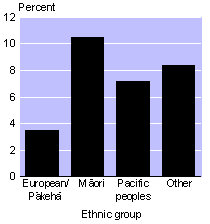
Source — Statistics NZ
Age Rates and Long-term Unemployment
YOUTH UNEMPLOYMENT RATE
-- AGED 15-19 YEARS
June 2003
13.6%
or one in 7 young people
MATURE UNEMPLOYMENT RATE
-- AGED 50-65 YEARS
June 2003
1.7%
or one in 59 mature people
LONG-TERM UNEMPLOYED (over 6 months)
June 2003
23,100 people
24% or one in 4 of the unemployed
LONGER-TERM UNEMPLOYED (over 2 years)
June 2003
6,000 people
6% or one in 16 of the unemployed
VERY LONG-TERM UNEMPLOYED (over 5 years)
June 2003
1,500 people
2% or one in 63 of the unemployed
Source — Statistics NZ
The Schemes and Subsidised Jobs
|
TASKFORCE GREEN |
388 |
|
JOB PLUS |
3,535 |
|
JOB PLUS MAORI |
97 |
|
JOB CONNECTION |
75 |
|
ENTERPRISE ALLOWANCE |
72 |
ENTERPRISE ALLOWANCE
with capitalisation |
246 |
TRAINING OPPORTUNITY PROGRAMME
(TOPS) COURSES) |
8,155 people |
|
YOUTH TRAINING (T.E.C.) |
5,514 people |
LIMITED SERVICE VOLUNTEERS
(Army) |
65 people |
|
CONSERVATION CORPS |
833 people |
|
YOUTH SERVICE CORPS |
100 people |
ACTIVITY IN THE COMMUNITY
(still counted as unemployed) |
626 |
Source — figures from Ministry of Social Development (formerly Work & Income NZ),Tertiary Education Commission (formerly Skill NZ) and Youth Affairs


